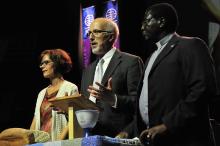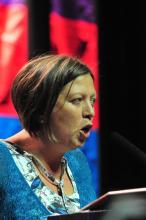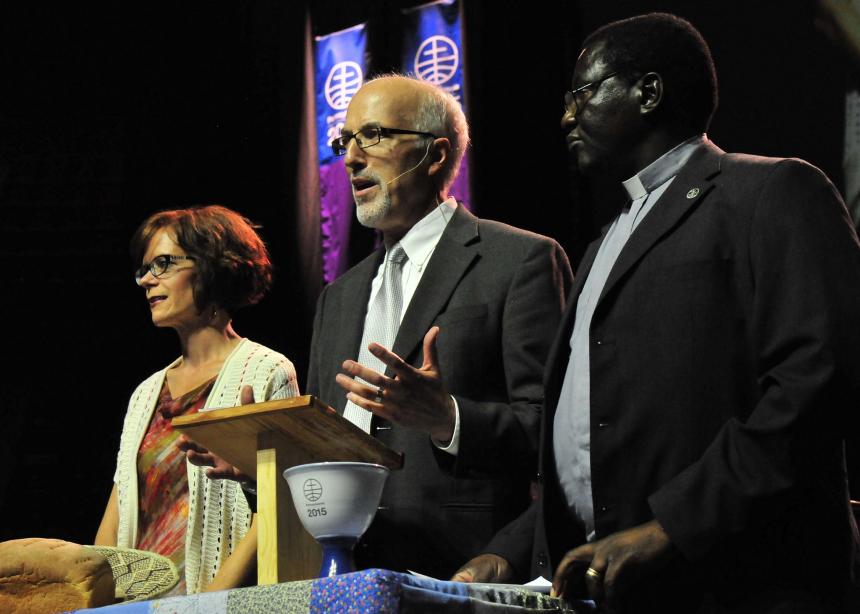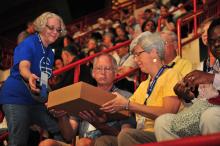Each person is never alone. They must live in community. Yet each also craves independence and autonomy.
Citing Jacob wrestling with God in Genesis 32, Wieteke van der Molen told Mennonite World Conference assembly attendees July 24 that since the interests of the group will always collide with those of the individual, each person must wrestle with friction and frustration.
Pastor of Schagen Mennonite Church in the Netherlands, van der Molen also operates the Doopersduin Mennonite retreat center. She said Jacob thought of no one but himself until he lost his community, had only autonomy, and was truly alone — until someone came along and struggled with him all night.
“Is Jacob in fact wrestling himself? Maybe,” she said. “The life of Jacob is one big struggle with the people around him, with their expectations, his own choices, his own way through life.”
Despite living by his own rules, Jacob wasn’t judged by God, but God remained present, just as he is present with us today.
“God merely walks with you, no matter the outcome,” van der Molen said. “It is Jacob who makes demands. Not God. And that is an Old Testament lesson for us modern people craving autonomy.”
She challenged her audience to think about their individual lives and the lives of churches within the broader Anabaptist community, making choices according to one’s own desires while acknowledging the surrounding community’s desires, hurts and frustrations.
“It is about taking responsibility for your actions,” she said. “For those of the community, for yourself, and, if necessary, making amends.
“To keep some sense of autonomy within community is like constantly wrestling with man and God and, most of all, yourself,” she said. “And even if you win, it leaves you slightly limping.”
In line with the day’s feature on music and voices of Europe, the evening offering highlighted Nohemy Ruth García of Spain. She presented “Despertar” (Awakening), a song she wrote to commemorate the 10th anniversary of the 2004 Madrid terrorist bombing, which killed 191 people and injured 1,800.
“I think it’s time in our churches, in our homes and in our communities; it’s a time for peace,” she said before singing. “It’s a time to do something about it. This song is a wakeup call. . . . Let’s take action and really work for peace for what God wants to bring into his kingdom.”
As she sang lyrics in Spanish about “awakening, a hope for peace in time for the future,” the first to wake up were half dozen glowing cellphones being waved in time by people sitting in a high corner of the arena. Joined first by a few others, then quickly hundreds more, the despertar enveloped the space with thousands of lights joining one voice shining into the darkness. Emotion evident on her face, García finished the song with a message that needed no further translation.
The service concluded with a communion service, including a gluten-free bread option and grape juice served in compostable cups.
Tim Huber is associate editor of Mennonite World Review. This article was written for Meetinghouse, a group of Mennonite publications.
See more coverage of the MWC assembly.
To see the video of this session, go the PA 2015 site: http://pa2015.mwc-cmm.org/watch-live.

The July 24 evening service concluded with a communion service led by Janet Plenert, MWC vice president, J. Nelson Kraybill, MWC president elect, and Danisa Ndlovu, MWC president. (Photo by Dale D. Gehman, for Meetinghouse)

Wieteke van der Molen, a pastor from the Netherlands, told the story of Jacob and his struggle between his own desires and the life of the community. “To keep some sense of autonomy within community is like constantly wrestling with man and God and, most of all, yourself,” she said. (Photo by Dale D. Gehman, for Meetinghouse)



Add new comment
Canadian Mennonite invites comments and encourages constructive discussion about our content. Actual full names (first and last) are required. Comments are moderated and may be edited. They will not appear online until approved and will be posted during business hours. Some comments may be reproduced in print.